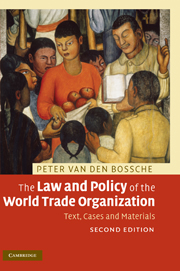Book contents
- Frontmatter
- Contents
- List of figures
- Preface to the first edition
- Preface to the second edition
- Table of cases
- Table of agreements
- 1 ECONOMIC GLOBALISATION AND THE LAW OF THE WTO
- 2 THE WORLD TRADE ORGANIZATION
- 3 WTO DISPUTE SETTLEMENT
- 4 PRINCIPLES OF NON-DISCRIMINATION
- 5 RULES ON MARKET ACCESS
- 6 RULES ON UNFAIR TRADE
- 7 TRADE LIBERALISATION VERSUS OTHER SOCIETAL VALUES AND INTERESTS
- 8 TOWARDS HARMONISATION OF NATIONAL REGULATION
- Epilogue
- Index
Preface to the second edition
Published online by Cambridge University Press: 05 June 2012
- Frontmatter
- Contents
- List of figures
- Preface to the first edition
- Preface to the second edition
- Table of cases
- Table of agreements
- 1 ECONOMIC GLOBALISATION AND THE LAW OF THE WTO
- 2 THE WORLD TRADE ORGANIZATION
- 3 WTO DISPUTE SETTLEMENT
- 4 PRINCIPLES OF NON-DISCRIMINATION
- 5 RULES ON MARKET ACCESS
- 6 RULES ON UNFAIR TRADE
- 7 TRADE LIBERALISATION VERSUS OTHER SOCIETAL VALUES AND INTERESTS
- 8 TOWARDS HARMONISATION OF NATIONAL REGULATION
- Epilogue
- Index
Summary
In the three years that have passed since I completed work on the first edition of this book, the interest in the world trading system has continued to grow. Ever more universities offer courses on international economic law in general and WTO law in particular. While unsubstantiated and misinformed criticism of the WTO is still the rave and bon ton in many circles, the WTO seems to be doing a better job at selling itself and slowly enlarging its base of support. This is all the more amazing since opposition to economic globalisation is not weakening and the Doha Development Round has thus far mainly produced disappointment. Perhaps there is a growing realisation, or in some circles reluctant acceptance, that the WTO and its law – while obviously wanting in many respects – make an effective contribution to managing economic globalisation and international trade. The WTO, and in particular its dispute settlement system applying and interpreting WTO law, have done a good job in balancing trade liberalisation with other societal values and interests, such as the protection of public health, the environment and economic development of developing countries. However, undoubtedly, the road is still long and the journey hazardous.
Braced by encouragement and inspired by comments of readers from Lesotho to India, many of them students but also many government officials and legal practitioners, I started in early 2007 on the second edition of The Law and Policy of the World Trade Organization.
- Type
- Chapter
- Information
- The Law and Policy of the World Trade OrganizationText, Cases and Materials, pp. xvii - xviiiPublisher: Cambridge University PressPrint publication year: 2008



